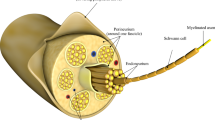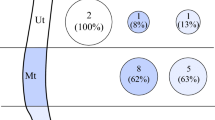Abstract
Background
Extranodal invasion (ENI) has been reported to be associated with a poor prognosis in several malignancies. However, previous studies have included perinodal fat tissue tumor deposits in their definitions of ENI. To investigate the precise nature of ENI in esophageal squamous cell carcinoma (ESCC), we excluded these tumor deposits from our definition of ENI and defined tumor cell invasion through the lymph node capsule and into the perinodal tissues as lymph node capsular invasion (LNCI). The aim of the current study was to elucidate the significance of LNCI in ESCC.
Methods
We investigated the associations between LNCI and other clinicopathologic features in 139 surgically resected ESCC. We also investigated the prognostic significance of LNCI in ESCC.
Results
LNCI was detected in 35 (25.2%) of 139 patients. The overall survival rate of the ESCC patients with LNCI was significantly lower than that of the ESCC patients with lymph node metastasis who were negative for LNCI. The survival difference between the patients with 1–3 lymph node metastases without LNCI and those with no lymph node metastasis was not significant. LNCI was significantly associated with distant organ recurrence. LNCI was also found to be an independent predictor of overall survival in addition to the number of lymph node metastases.
Conclusions
LNCI in ESCC patients is an indicator of distant organ recurrence and a worse prognosis. LNCI could be used as a candidate marker for designing more precise staging and therapeutic strategies for ESCC.



Similar content being viewed by others
References
Kato H, Fukuchi M, Miyazaki T, et al. Surgical treatment for esophageal cancer. Current issues. Dig Surg. 2007;24:88–95.
Isono K, Sato H, Nakayama K. Results of a nationwide study on the three-field lymph node dissection of esophageal cancer. Oncology. 1991;48:411–20.
Akiyama H, Tsurumaru M, Udagawa H, Kajiyama Y. Radical lymph node dissection for cancer of the thoracic esophagus. Ann Surg. 1994;220:364–72.
Dhar DK, Hattori S, Tonomoto Y, et al. Appraisal of a revised lymph node classification system for esophageal squamous cell cancer. Ann Thorac Surg. 2007;83:1265–72.
Hasebe T, Sasaki S, Imoto S, Ochiai A. Significance of nodal metastatic tumor characteristics in nodal metastasis and prognosis of patients with invasive ductal carcinoma of the breast. Cancer Sci. 2003;94:181–7.
Wind J, Lagarde SM, Ten Kate FJ, Ubbink DT, Bemelman WA, van Lanschot JJ. A systematic review on the significance of extracapsular lymph node involvement in gastrointestinal malignancies. Eur J Surg Oncol. 2007;33:401–8.
Brasilino de Carvalho M. Quantitative analysis of the extent of extracapsular invasion and its prognostic significance: a prospective study of 170 cases of carcinoma of the larynx and hypopharynx. Head Neck. 1998;20:16–21.
Fisher BJ, Perera FE, Cooke AL, et al. Extracapsular axillary node extension in patients receiving adjuvant systemic therapy: an indication for radiotherapy? Int J Radiat Oncol Biol Phys. 1997;38:551–9.
Fleischmann A, Thalmann GN, Markwalder R, Studer UE. Prognostic implications of extracapsular extension of pelvic lymph node metastases in urothelial carcinoma of the bladder. Am J Surg Pathol. 2005;29:89–95.
Griebling TL, Ozkutlu D, See WA, Cohen MB. Prognostic implications of extracapsular extension of lymph node metastases in prostate cancer. Mod Pathol. 1997;10:804–9.
Myers JN, Greenberg JS, Mo V, Roberts D. Extracapsular spread. A significant predictor of treatment failure in patients with squamous cell carcinoma of the tongue. Cancer. 2001;92:3030–6.
van der Velden J, van Lindert AC, Lammes FB, et al. Extracapsular growth of lymph node metastases in squamous cell carcinoma of the vulva. The impact on recurrence and survival. Cancer. 1995;75:2885–90.
Baba M, Aikou T, Natsugoe S, et al. Lymph node and perinodal tissue tumor involvement in patients with esophagectomy and three-field lymphadenectomy for carcinoma of the esophagus. J Surg Oncol. 1997;64:12–6.
Tanabe T, Kanda T, Kosugi S, et al. Extranodal spreading of esophageal squamous cell carcinoma: clinicopathological characteristics and prognostic impact. World J Surg. 2007;31:2192–8.
Ueno H, Mochizuki H, Fujimoto H, Hase K, Ichikura T. Autonomic nerve plexus involvement and prognosis in patients with rectal cancer. Br J Surg. 2000;87:92–6.
Prabhudesai A, Arif S, Finlayson CJ, Kumar D. Impact of microscopic extranodal tumor deposits on the outcome of patients with rectal cancer. Dis Colon Rectum. 2003;46:1531–7.
Etoh T, Sasako M, Ishikawa K, Katai H, Sano T, Shimoda T. Extranodal metastasis is an indicator of poor prognosis in patients with gastric carcinoma. Br J Surg. 2006;93:369–73.
Ishikawa K, Hashiguchi Y, Mochizuki H, Ozeki Y, Ueno H. Extranodal cancer deposit at the primary tumor site and the number of pulmonary lesions are useful prognostic factors after surgery for colorectal lung metastases. Dis Colon Rectum. 2003;46:629–36.
Japanese Society for Esophageal Diseases. Guidelines for the clinical and pathological studies on carcinoma of the esophagus. 10th ed. Tokyo: Kanehara; 2007.
Tachikawa D, Inada S, Kotoh T, Futami K, Arima S, Iwashita A. An evaluation of malignancy and prognostic factors based on mode of lymph node metastasis in esophageal carcinoma. Surg Today. 1999;29:1131–5.
Kuwano H, Nakajima M, Miyazaki T, Kato H. Distinctive clinicopathological characteristics in esophageal squamous cell carcinoma. Ann Thorac Cardiovasc Surg. 2003;9:6–13.
Yamagata K, Kumagai K, Shimizu K, Masuo K, Nishida Y, Yasui A. Gastrointestinal cancer metastasis and lymphogenous spread: viewpoint of animal models of lymphatic obstruction. Jpn J Clin Oncol. 1998;28:104–6.
Yamagata K, Kumagai K. Experimental study of lymphogenous peritoneal cancer dissemination: migration of fluorescent-labelled tumor cells in a rat model of mesenteric lymph vessel obstruction. J Exp Clin Cancer Res. 2000;19:211–7.
Kato H, Miyazaki T, Nakajima M, et al. Sentinel lymph nodes with technetium-99m colloidal rhenium sulfide in patients with esophageal carcinoma. Cancer. 2003;98:932–9.
Kitagawa Y, Fujii H, Mukai M, et al. Intraoperative lymphatic mapping and sentinel lymph node sampling in esophageal and gastric cancer. Surg Oncol Clin N Am. 2002;11:293–304.
Author information
Authors and Affiliations
Corresponding author
Rights and permissions
About this article
Cite this article
Sakai, M., Suzuki, S., Sano, A. et al. Significance of Lymph Node Capsular Invasion in Esophageal Squamous Cell Carcinoma. Ann Surg Oncol 19, 1911–1917 (2012). https://doi.org/10.1245/s10434-012-2232-7
Received:
Published:
Issue Date:
DOI: https://doi.org/10.1245/s10434-012-2232-7




